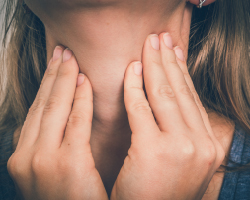
It feels like you're moving in slow motion. You're constantly exhausted and moody. You feel sad and worthless. You have trouble sleeping at night.
These signs often indicate depression. But they can also point to a thyroid disorder, says the American Association of Clinical Endocrinology (AACE).
A maze of symptoms
The thyroid is a gland situated just below your Adam's apple and right above your collarbone. It makes hormones that control nearly every aspect of your body's function.
If the thyroid stops producing the right level of hormones, the effects can be far-reaching. According to the AACE, a thyroid disorder can cause these symptoms in addition to mood changes:
- Constipation or more frequent bowel movements.
- Sweating.
- Coarse, dry skin.
- Muscle weakness and palpitations.
- Menstrual irregularities.
- Weight changes.
- Hair loss.
- Infertility.
- A goiter (swelling of the neck).
Check your neck
If you're not sure whether your symptoms point to a thyroid disorder, the AACE recommends doing the thyroid neck check. You'll need a glass of water and a handheld mirror.
- Hold the mirror in front of you so that you can see the area of your neck just below the Adam's apple and right above the collarbone.
- Tip your head back, making sure that you can still see this part of your neck in the mirror.
- Take a drink of water and swallow.
- Watch your neck for any bulges or protrusions when you swallow. You may need to do this a few times.
- See your doctor right away if you see any bulges or protrusions—you could have an enlarged thyroid gland or a thyroid nodule (a bump) that may indicate thyroid disease or cancer.
Treatments for thyroid problems include taking thyroid hormones, taking radioactive iodine (which impairs the thyroid's production of hormones) and surgically removing most of the thyroid gland.
Reviewed 7/25/2024
Sources
- American Association of Clinical Endocrinology. "All About Thyroid." https://www.aace.com/disease-and-conditions/thyroid.
- American Association of Clinical Endocrinology. "How to Check Your Thyroid." https://www.aace.com/disease-and-conditions/thyroid/how-check-your-thyroid.